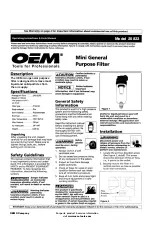
The Reverse Osmosis process, also known as hyper filtration, is the finest filtration process known
till date. The process ensures removal of particles as small as ions from a solution. Reverse
Osmosis uses a semi-permeable membrane to remove salts from potable /brackish water. In
Reverse Osmosis, water pressure applied to the concentrated side forces the process of osmosis
into reverse. Under enough pressure, treated water is ‘squeezed’ through the membrane from the
concentrated side to the diluted side. Salts dissolved in water as charged ions are repelled by the
RO membrane. The rejected impurities on the concentrated side of the membrane are washed
away in a stream of waste water and thus, do not get accumulated as in a traditional filter.
Stage 01:
Sediment Filter: The raw water is made to pass through 'Sediment Filter', which is the best
solution to remove impurities such as sand, silt and other sediments that you may or may not be
able to see in the water supply.
Stage 02:
Activated Carbon Block: The water, now free from all sediments is made to pass through
'Activated Carbon Block', which removes bad taste, odour, chemicals like chlorine, and other
impurities.
Stage 03:
Reverse Osmosis Membrane: The polished water, free from sediment and chemical impurities is
made to pass through RO membrane which removes dissolved solids such as calcium carbonate,
chlorides, nitrates, etc. along with any organic matter.
Stage 04:
UF Membrane: Acting as a safety mechanism, the Ultra Filtration or UF membrane removes high
molecular–weight substances, colloidal materials, organic and inorganic polymeric molecules
including bacteria and viruses and cysts from water.
Stage 05:
TDS Control: The unique and patented TDS control system ensures retention of essential natural
minerals [required for healthy body] in purified water.
Stage 06:
Post Carbon: Cast out of high quality activated carbon, the filter enhances the taste of purified
water.
Automatic Shut-off Valve Assembly:
To conserve water, KENT GEM Mineral RO™ Non-Electric has an automatic shut-off valve system.
When the storage tank is filled to the capacity and the RO faucet is closed, pressure closes the
shut-off valve to stop the flow to drain. After some water is drawn and when the pressure in the
system drops, the shut-off valve opens to allow water to flow again.
Ultra Filtration is a separation process that uses membranes with pore size in the range of 0.1 to
0.01 micron. UF membrane removes high molecular-weight substances, colloidal materials,
organic and inorganic polymeric molecules including bacteria and viruses. Low applied pressure is
sufficient to achieve high flux rates from an ultra-filtration membrane.
Reverse Osmosis Process
Filtration Stages
UF Process
3
Water Flow Diagram
4
























